A Small-Ship Expedition Cruise Is the Best Way to See the Galápagos Islands in All Their Glory
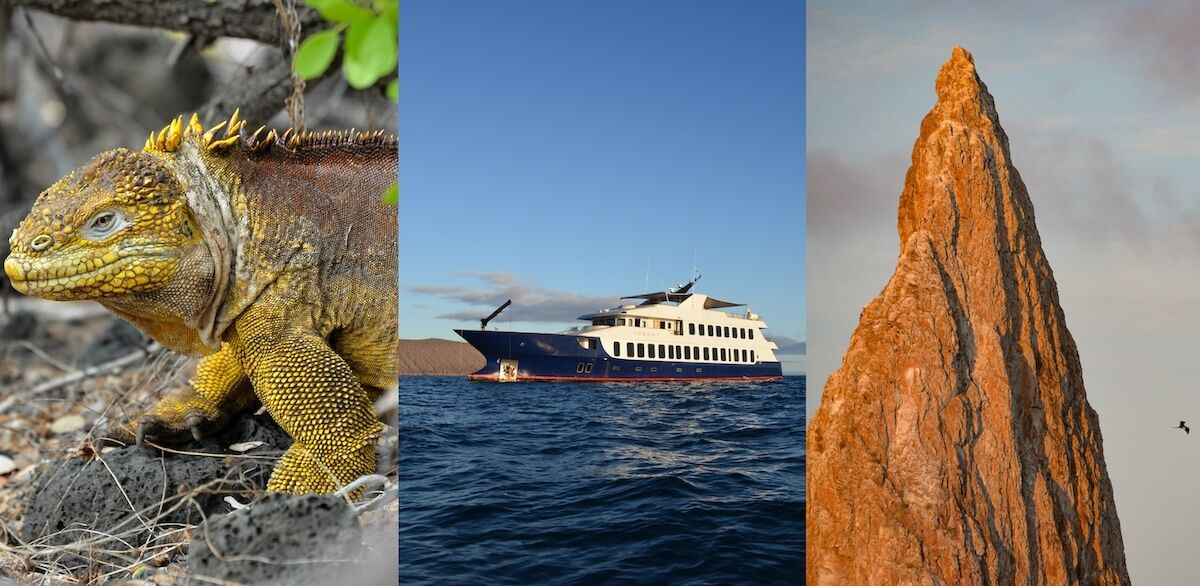
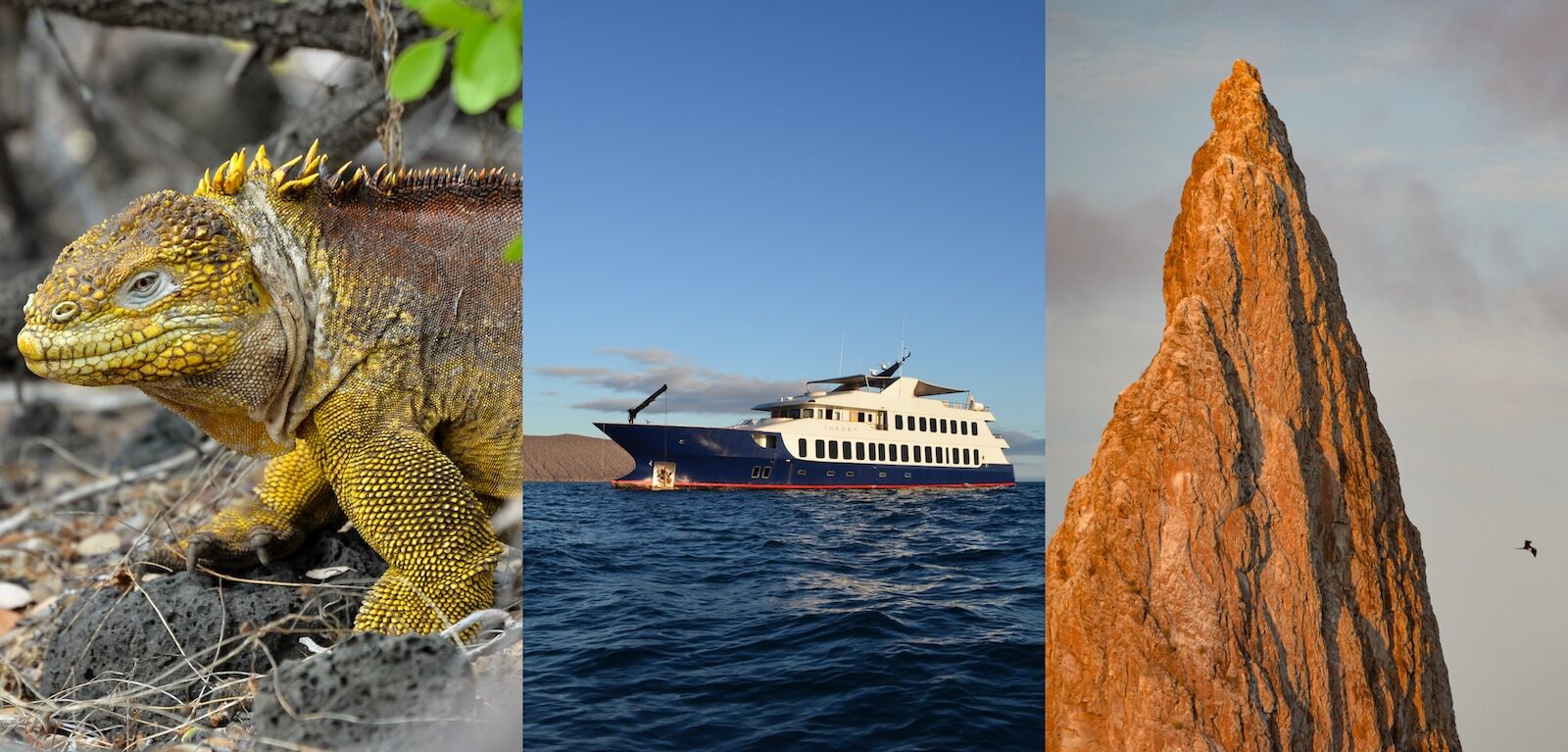
Whale!” Mark shouted at breakfast. The rest of us passengers, the ship’s captain, and the naturalist guides stood up at once. We lifted the binoculars strapped around our necks and scanned the horizon from the sundeck. The Bolivar Channel is the best place to see whales around the Galápagos Islands, and eagle-eyed Mark, with his patience and determination, had spotted a splash nearby. A fin appeared and we all gasped and whooped.
“The pangas are ready. Let’s all jump in and see it from up close,” Gustavo Barba, one of the naturalist guides, said, referring to the small inflatable boats on the ship that could take us closer without disturbing the whales.
We gobbled down what was left of our delicious breakfast of humitas, fresh fruit juice, and Galápagos coffee. In less than 10 minutes, we were geared up and zooming toward the last sighting of the animal, cameras at the ready. What ensued was 30 minutes of observing a mother humpback and her calf bobbing in and out of the water, giving us the best show any of us had ever seen before 9 AM.
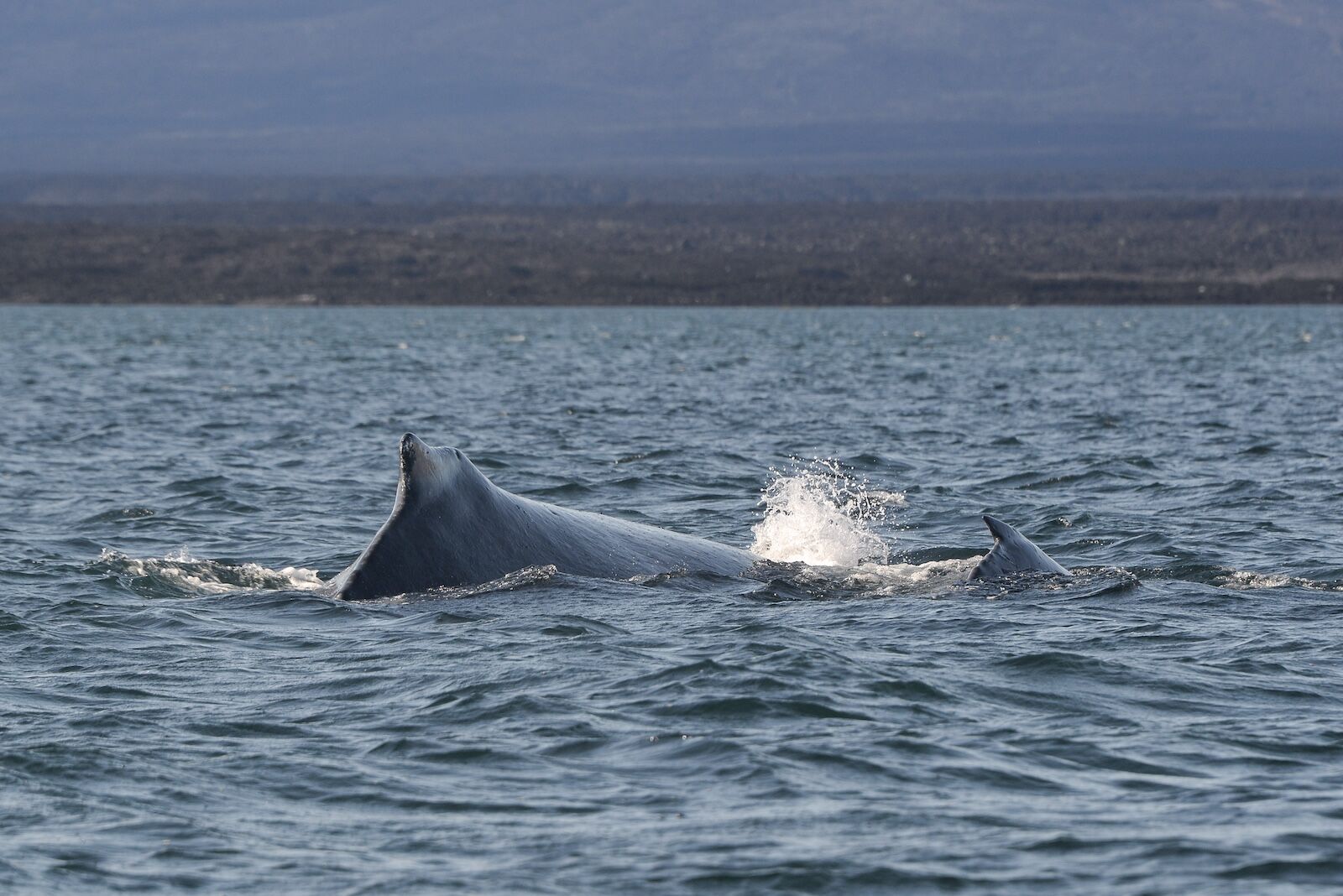
A mother humpback and her calf in the Bolivar Channel. Photo: Jesse Adams
This is what it’s like to take a trip with Ecoventura around the Galápagos Islands: Everything is designed to give the few guests on board the most adrenaline-filled wildlife-watching experience of their life. You want to swim with manta rays? Sure thing! Just jump off that panga and have fun. You want to spend an extra 20 minutes watching a just-born baby sea lion playing in a puddle, or looking at a giant tortoise walking by with a flower in its mouth? The crew can make time for that. You want to dive off the ship into the clear, warm waters of the Pacific and go for a swim? The captain will arrange it for you. At the end of a seven-day sailing with Ecoventura, you’ll have seen more wildlife than you can anticipate coupled with a lifetime of adventures and excitement.
What sets Ecoventura Galápagos cruises apart
There are dozens of cruise lines sailing expedition ships around the Galápagos Islands, including some of the biggest names in the industry like National Geographic-Lindblad Expeditions, Celebrity Cruises, and Silversea. Ecoventura is just one small player among all of those operators, but it’s got a multitude of advantages.
Ship size
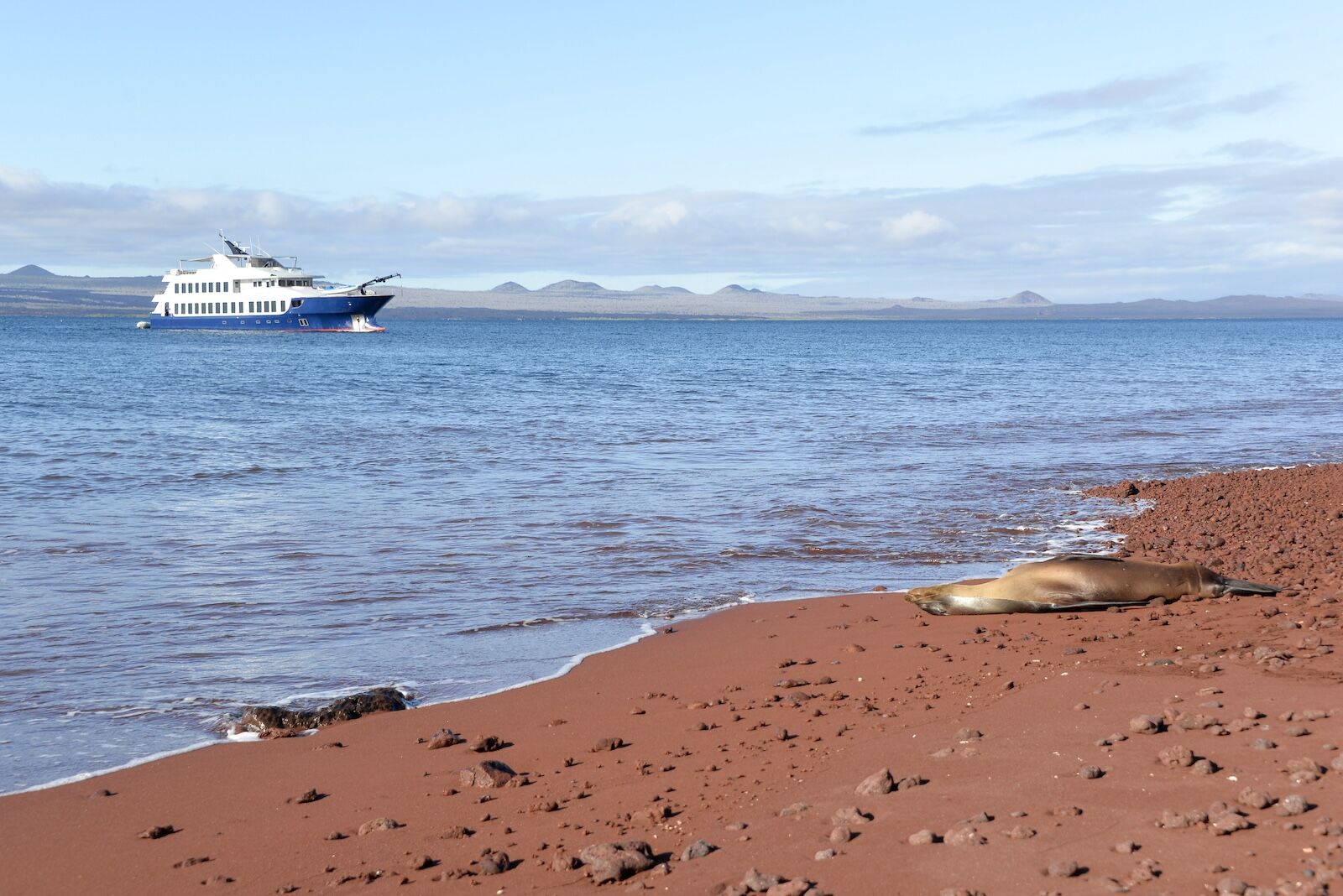
Our ship, Ecoventura’s Theory, anchored near Rabida Island. Photo: Jesse Adams
The most significant benefit of traveling with Ecoventura is the size of the ships. While the Galápagos National Park, which covers 97 percent of the islands, has capped the number of passengers for any expedition ship to 100, Ecoventura keeps things even more intimate with a maximum of 20 guests per ship. (There were only 14 of us on the trip I took in late September.) Such a low number of passengers not only makes the voyage a social experience during which it’s hard not to bond with your fellow travelers, but also a lot more practical and fun. Everyone can participate in activities at the same time without having to wait their turn, whether that’s kayaking, snorkeling, swimming, or going for a guided walk on land. It also allows for spontaneous decisions like going to look at a whale up close early in the morning, or even going for after-dinner drinks and dancing while anchored near one of the towns. Having such few passengers also makes the relationship between the crew and the travelers a lot more personal and casual. The crew, including the captain, knows your name and you know theirs, they take an interest in your life, and you quickly end up sharing jokes and anecdotes with them like you do with the rest of the passengers.
Naturalist guides
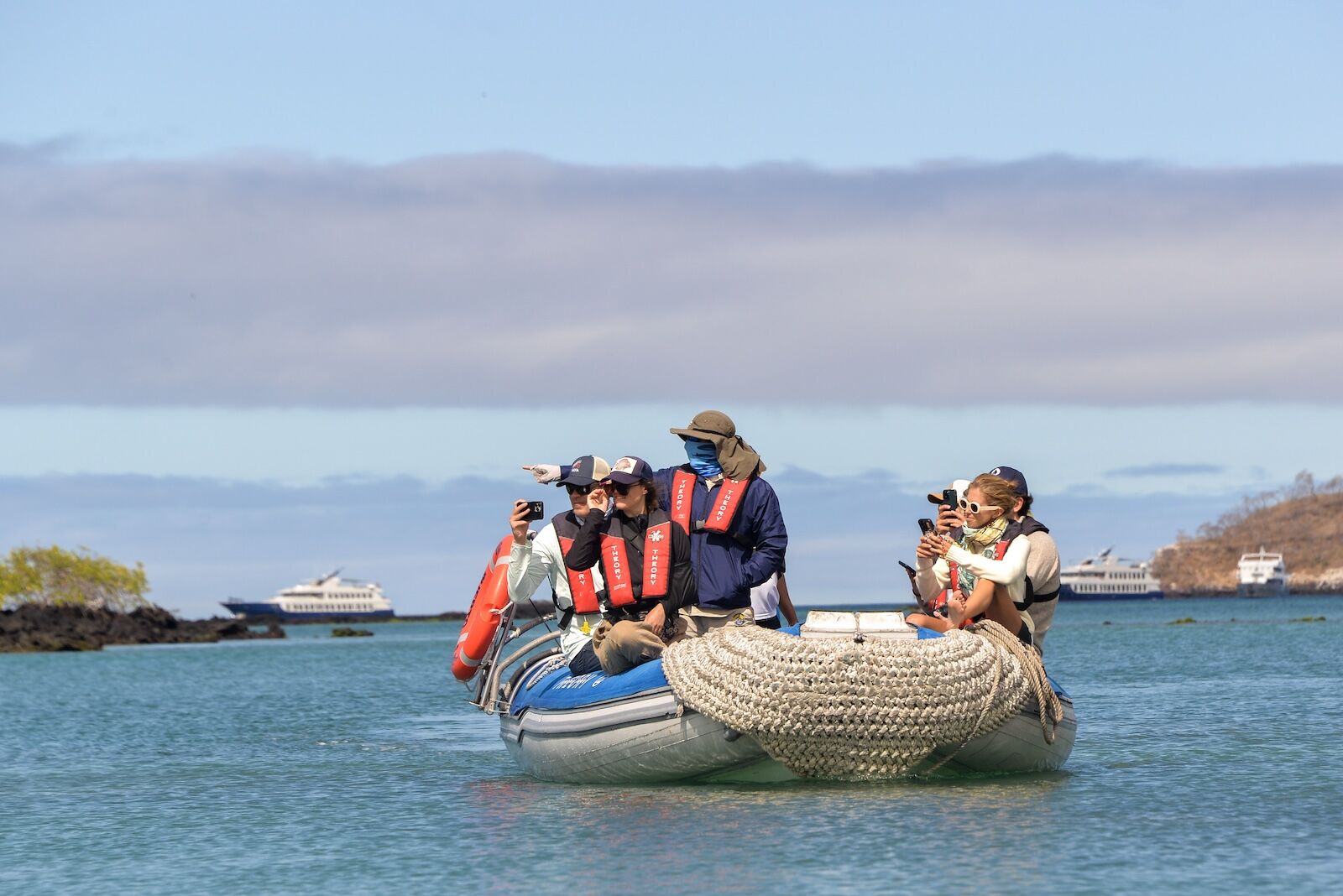
Looking for Galápagos penguins and Galápagos cormorants around Elizabeth Bay on Isabela Island. Photo: Jesse Adams
On Ecoventura ships, there are no fewer than two full-time naturalist guides on board. The guides — highly trained, multilingual locals certified by the very demanding Galápagos National Park — accompany you throughout the journey on all the activities and provide expert commentary on the history, geology, flora, fauna, and environmental challenges of the archipelago. They are the ones who know when and where to see a particular species. They point out subtle behavior and physical differences in the wildlife that you’d never spot on your own, and they keep both the animals and the travelers safe. Without a doubt, the naturalist guides make the trip, and on Ecoventura, the ratio of naturalist guide to passenger is a very comfortable one to 10, one of the highest ratios among the operators in the archipelago. The naturalists answer every question you might have, and they also do their best to find the species you’re looking for, no matter the time of day or the location. They even give quick astronomy lessons from the sundeck at night if you ask for one.
Quiet but very effective luxury
Ecoventura is one of only three cruise lines in the world with the very sought-after Relais & Chateaux label. Relais & Châteaux is a not-for-profit, selective consortium of independently owned luxury properties, and the label is a guarantee of top-notch service and excellent cuisine, all with a local focus. While travelers to the Galápagos Islands are there for the landscapes and the wildlife, they also often appreciate life’s little luxuries. That said, don’t expect an ostentatiously decorated interior, immense cabins, and over-the-top amenities – it’s quiet luxury you’re dealing with here. In other words, everything is simple, but very high-quality. The all-Ecuadorian crew is attentive and anticipates all your needs, going as far as hosing your feet clean after spending time at the beach and providing warming tea and hot chocolate after a long snorkeling session. The food is exceptionally good with local specialties served at every meal, including patacones (fried plantains), seco de pollo (chicken stew), and Ecuadorian ceviche, among others. The chef is also extremely accommodating to those with a special diet. I’m a vegetarian and I was presented with a special vegetarian menu at dinner every night, as well as a vegetarian substitute for all the proteins served.
A priority on sustainability
There are many technical and complicated things that Ecoventura, a carbon-neutral operator, is doing to reduce its impact on the fragile environment of the islands. One of those is choosing to sail ships that are designed to be light and hydrodynamic to use less fuel (and therefore emit less CO2 and NO2). But it’s the small, daily efforts on board that I noticed the most during my trip.
To reduce the amount of waste, there are no single-use products on board, including no paper napkins, no plastic water bottles, no straws, and no paper or plastic cups. The toiletries in the bathrooms are all in reusable and refillable glass containers and there is a water dispenser to refill stainless-steel water bottles. While this may seem like a small gesture, every little bit helps, especially in a remote and vulnerable location like the Galápagos Islands where waste management and disposal is a serious challenge.
Beyond the reduction of waste, it’s the effort to source local ingredients that I found most admirable. More than half of all the ingredients are sourced from the islands to not only benefit the local community, but also reduce carbon emissions linked with shipping food from the mainland, which is 600 miles away.
The itineraries available and which one to choose
Ecoventura sails two routes: Itinerary A, also known as Beaches and Bays, the southern and central route; and Itinerary B, known as Volcanic Wonders, the western and northern route. Both itineraries last seven days and start from the island of San Cristóbal, where the main airport is located. It’s possible to travel the two itineraries back to back for a 14-day comprehensive exploration of the Galápagos Islands.
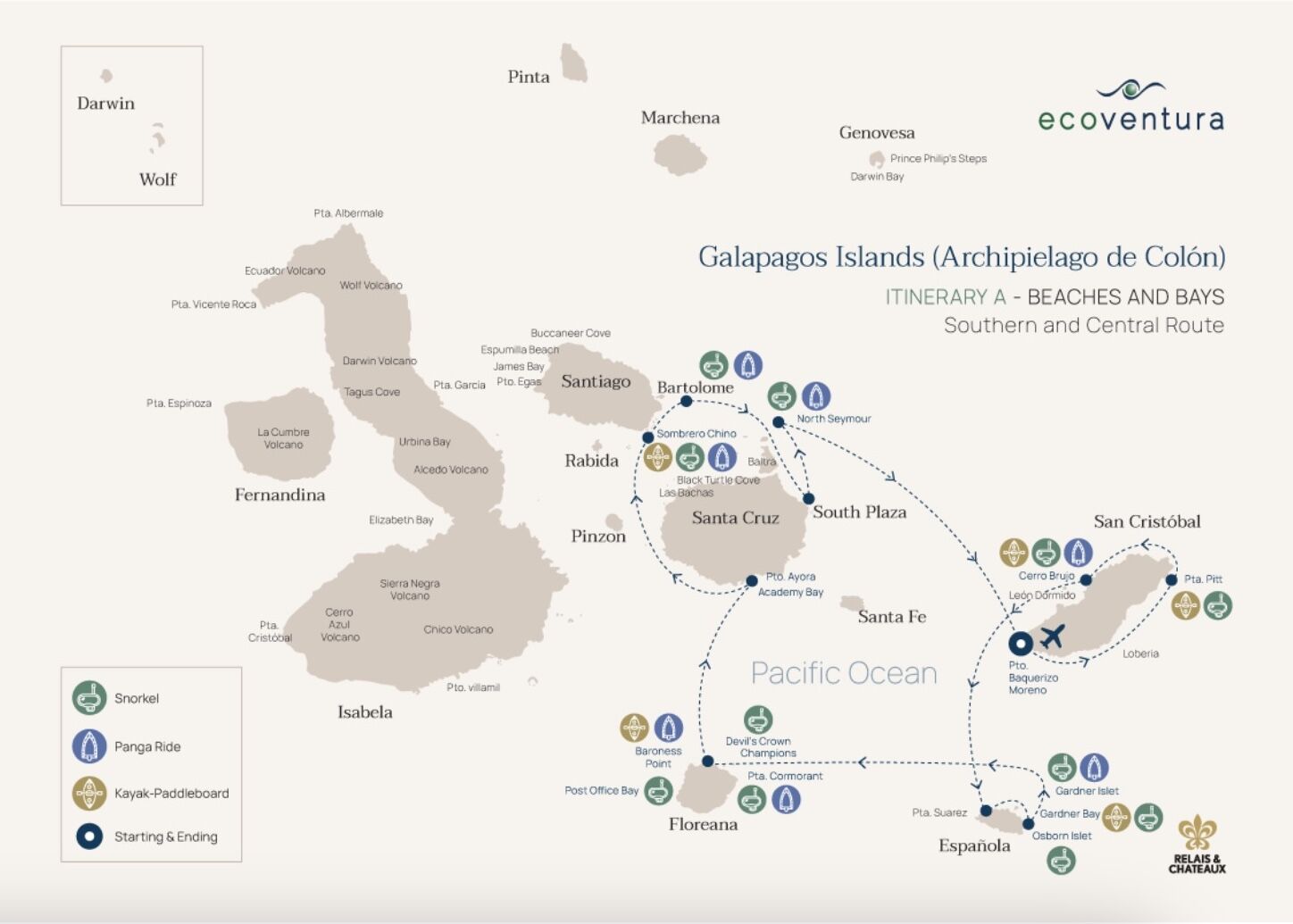
Itinerary A, also known as Beaches and Bays, the southern and central route. Map: Ecoventura
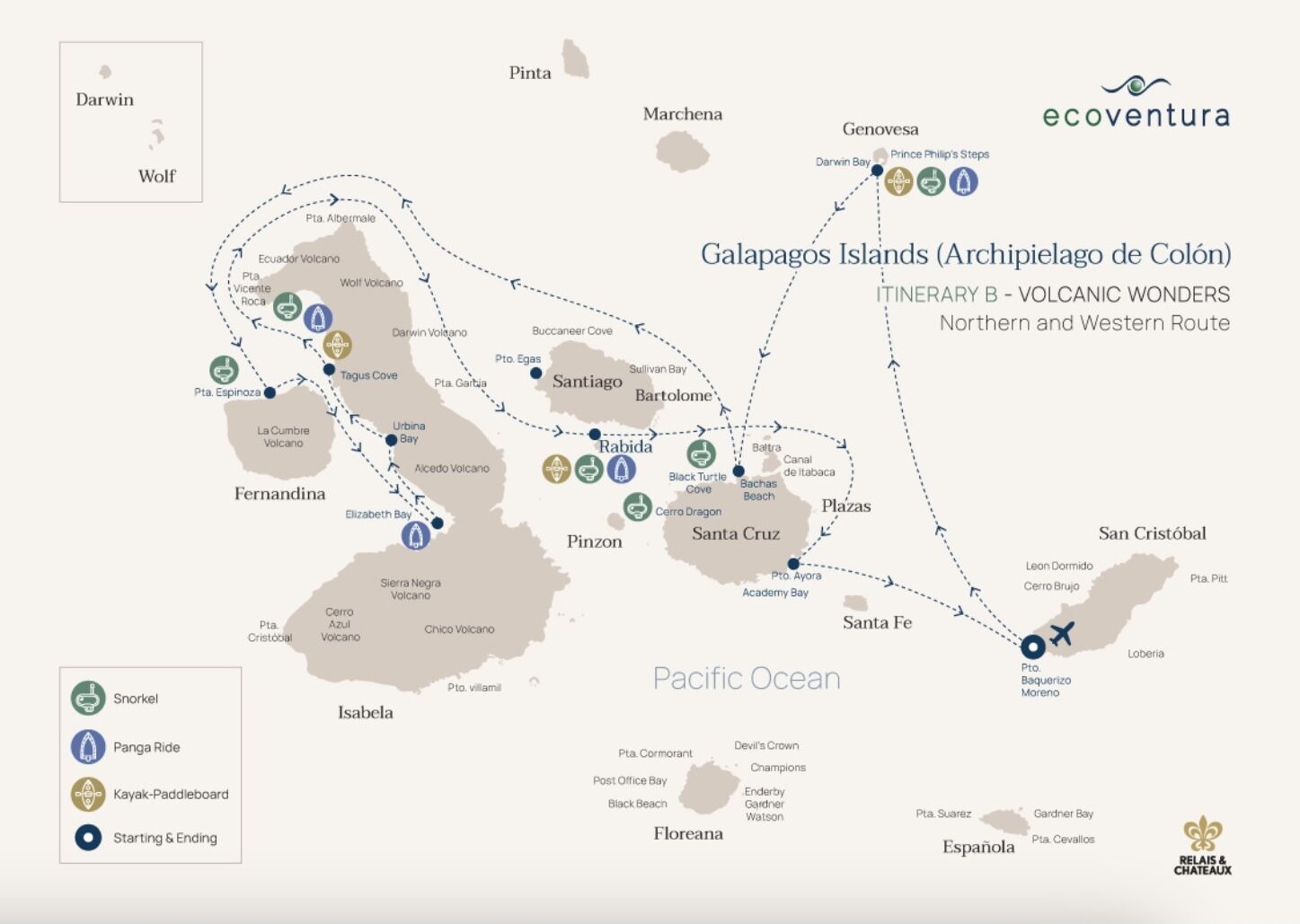
Itinerary B, known as Volcanic Wonders, the western and northern route. Map: Ecoventura
Of the two routes, I elected to travel on Itinerary B. The choice was a difficult one, as both routes present advantages. Ultimately, it was the high likelihood of seeing penguins that made me opt for Itinerary B — and I was lucky enough to see dozens of them both on rocky shores and underwater. While they can also be spotted on itinerary A, the penguin population is a lot smaller in this part of the islands, and therefore, a little more difficult to see. Itinerary A, however, offers travelers a good chance of seeing dolphins and the Galápagos albatross, which are mostly found around Española Island.
The main difference between the two itineraries, however, is the landscape. Gustavo Barba, one of the naturalist guides working with Ecoventura, explains that because the southern and central islands are the oldest of the archipelago, the landscape is flatter and features more white-sand beaches. The northern and western islands, however, are younger and therefore offer a more volcanic and mountainous scenery.
Note that the itineraries have been created in such a way that the ship mostly sails from one island or location to the next at night so passengers can make the most of daylight hours. It’s another way that Ecoventura works to give travelers the best experience possible.
A schedule jam-packed with activities
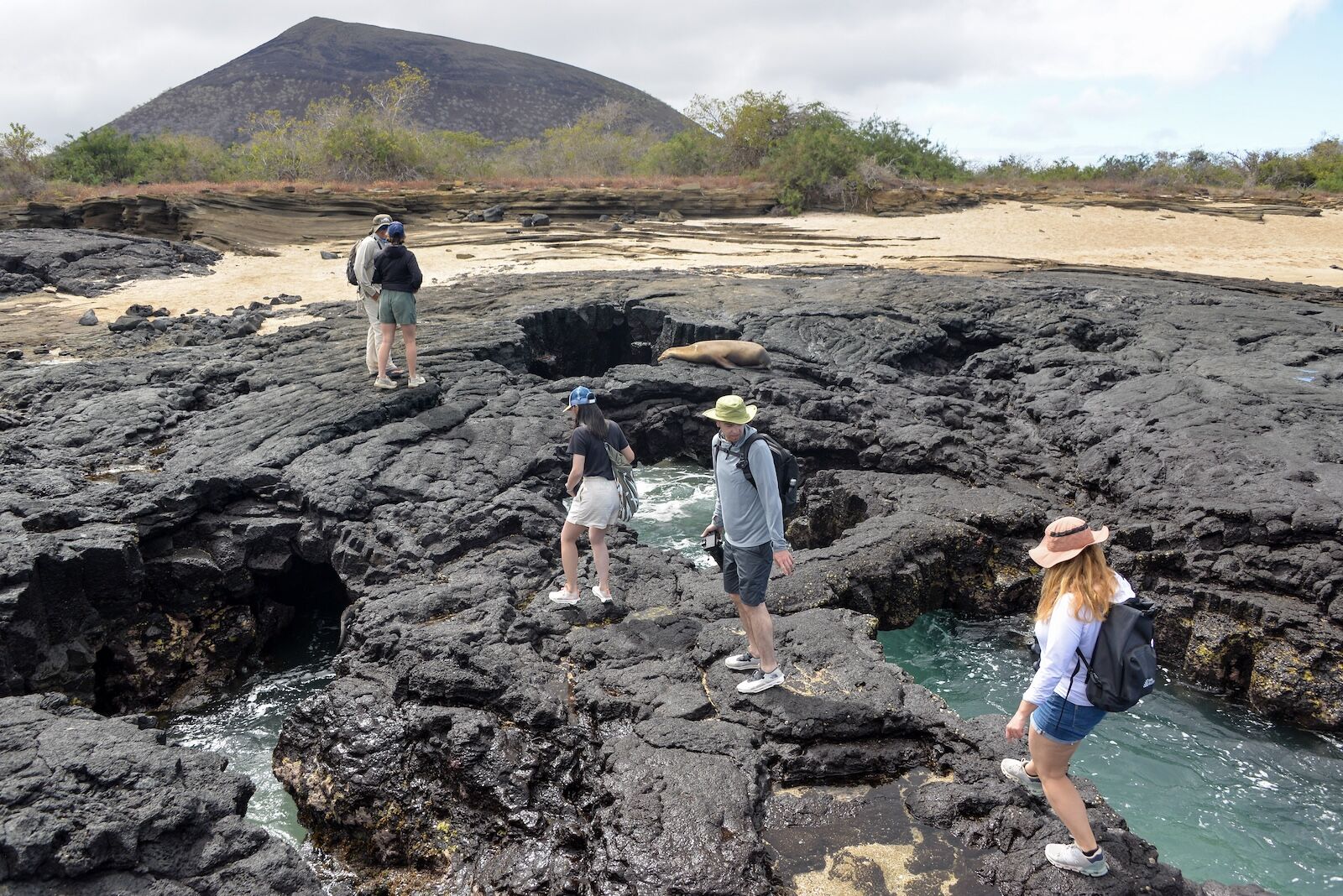
Walking on the rocks on Santiago Island, observing sea lions and fur seals. Photo: Jesse Adams
The point of traveling to the Galápagos Islands is to see as much of the unique wildlife and landscape as possible. Ecoventura, as such, has created daily schedules that are packed with activities that allow you to spend as much time outdoors with the animals as possible.
That means that you’ll get to snorkel, hike, go on panga rides, kayak, SUP, and swim daily, and often multiple times per day. It all starts at 9 AM after breakfast and ends at around 6 PM, with a couple of hours to break for lunch and take a siesta. All the activities last a minimum of one hour and are guided by the naturalists to maximize wildlife sightings and educational opportunities. While the schedule is set, it’s not rigid and more time can be allocated to observe a particular animal or take in a view.
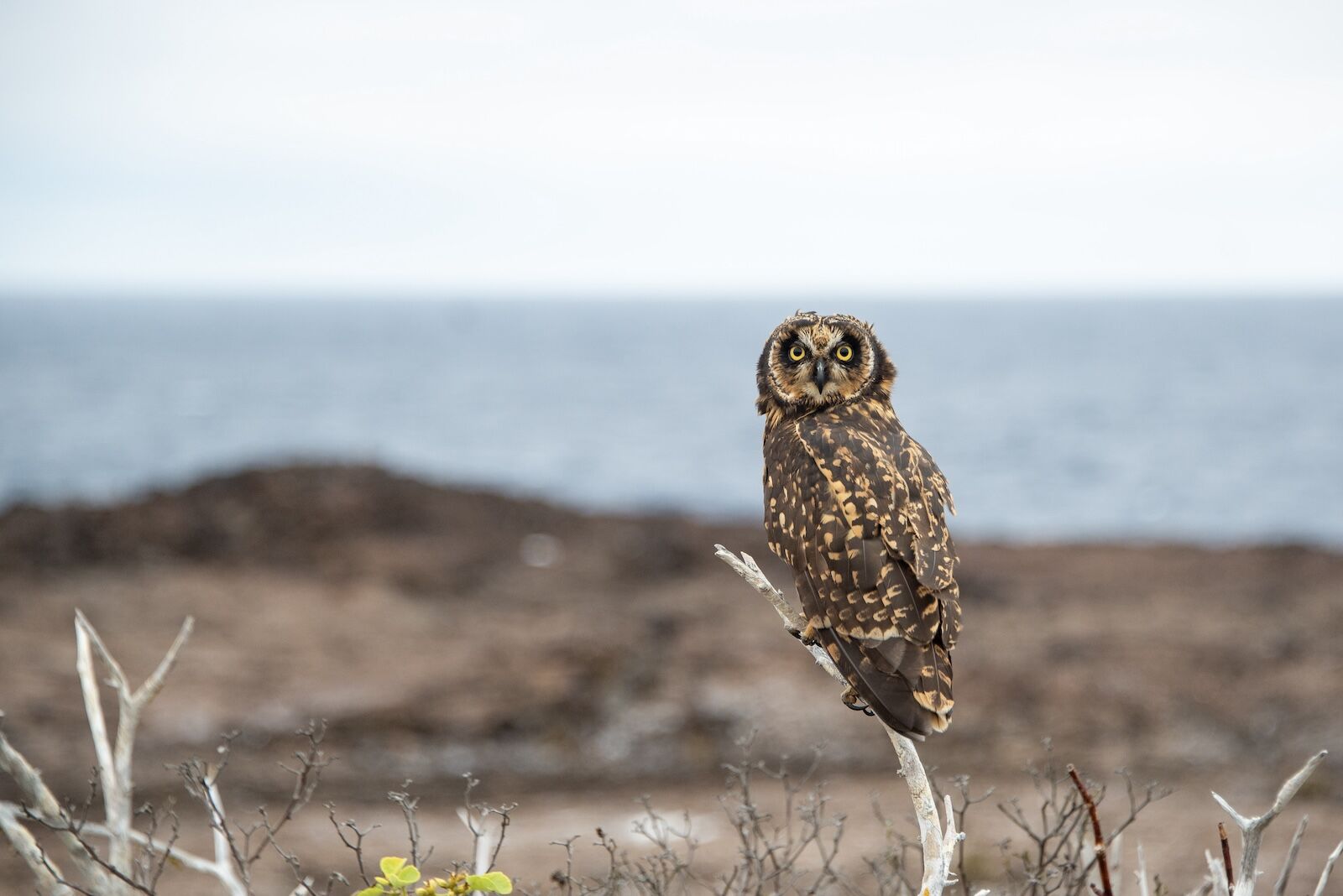
Seeing two Galápagos owls during our time on Genovesa Island was a highlight. Like most wildlife in the archipelago, the owls aren’t afraid of camera-toting Homo Sapiens Photo: Jesse Adams
While on Genovesa Island, we stopped to look for the Galápagos owl and found two in one location. We spent much more time observing and photographing them than was initially planned, but it ended up being the highlight of everyone’s day. The same thing happened when we hiked in Puerto Egas on the island of Santiago; we encountered a colony of sea lions, including multiple newborn pups (even one with the umbilical cord still attached). We spent a long time observing them from the required distance of six feet, paying no attention to the clock.
Fitness level and experience required
While it is imperative to be able-bodied to travel around the Galápagos Islands with Ecoventura, there’s no need to be an athlete or an outdoors expert, as long as you have all the gear needed, you’ll be fine. All the hikes are gentle, allowing everyone to participate, and the kayaking and SUPing sessions are all organized in safe locations with no current. The same goes for snorkeling. While I’m a swimmer, I had never snorkeled in deep water before this trip and took to it very easily in the calm waters. All the activities are supervised by the naturalists who make sure everyone is secure and comfortable at all times. You can also opt out of any activities you don’t wish to partake in. There’s no pressure or expectation from anyone on board.
My experience
At the end of my first full day in the Galápagos Islands with Ecoventura, a day spent hiking and snorkeling in and around Genovesa Island, I already knew this was the best trip I had ever taken in my entire life. Little did I know that every day to follow was going to be even better than the previous one, filled with more wildlife, more fun, and more excitement.
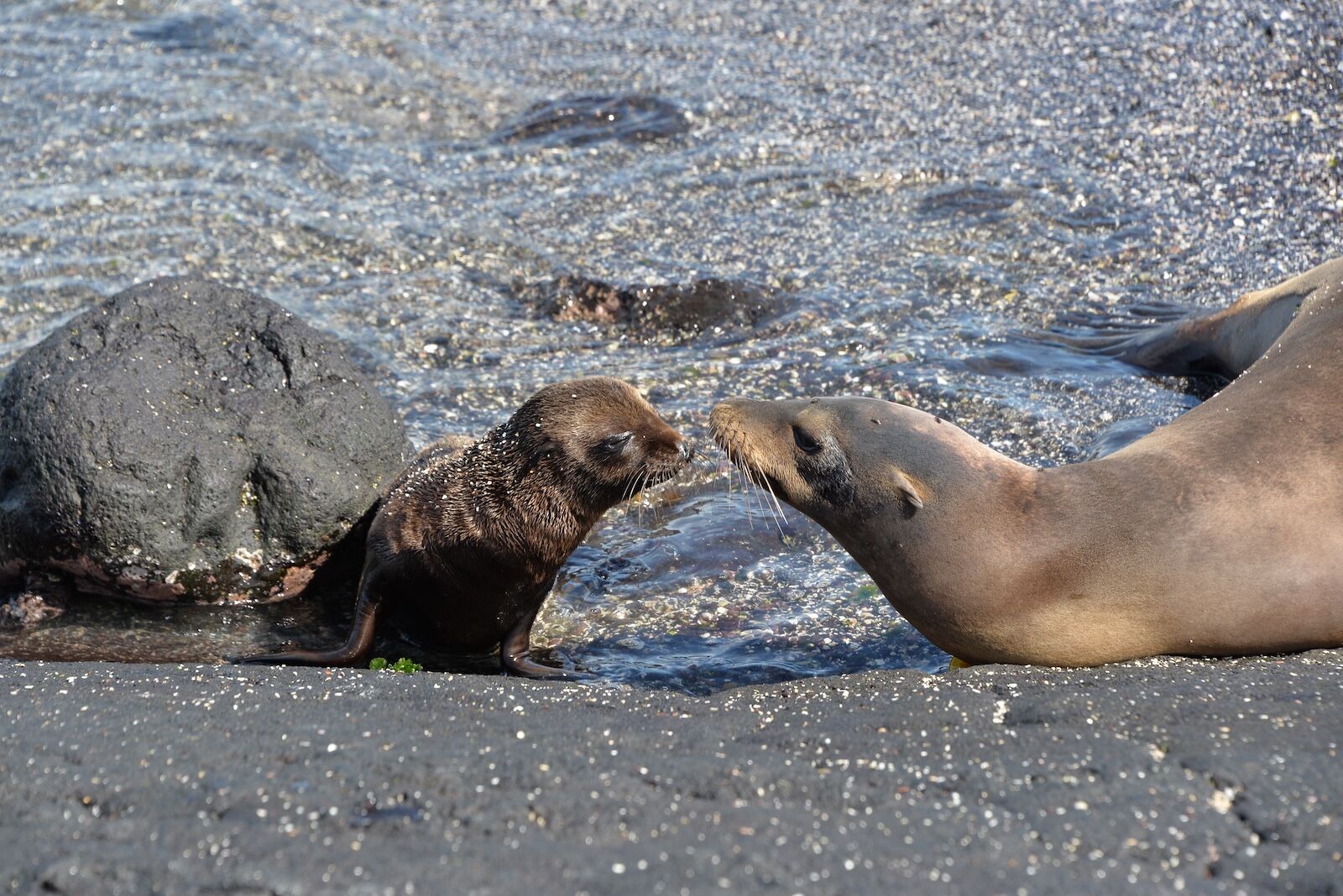
Galápagos sea lion pups and their parents are mesmerizing. You can watch them for hours without ever getting bored. Photo: Jesse Adams
Everything I had ever hoped to see, I saw up close and in a more magical way than I ever thought possible. I observed sea lion mothers peacefully nursing and cuddling their pups, marine iguanas eating algae underwater, Galápagos penguins mating, and fuzzy baby pelicans begging their parents for food. I even swam alongside sea turtles and huge manta rays, making for the most adrenaline-filled day of my life. Looking at all this thriving wildlife filled me with intense joy, but also with a deep appreciation for life on Earth. To say that I was high on life for seven straight days would be incredibly accurate – Ecoventura made it all possible, and all I want is to experience that feeling again.
How to best organize your trip
We hope you love the hotels we recommend! Just so you know, Matador may collect a small commission from the links on this page if you decide to book a stay.
Before traveling to the islands, you need to make your way to mainland Ecuador, whether to Quito, the capital of the country, or Guayaquil on the coast. No matter the destination, Ecoventura recommends that travelers arrive at least one day before the flights that take them to the Galápagos Islands, and offers two complimentary hotel nights for that purpose.
My partner and I arrived two nights before our departure for the islands and stayed at the comfortable and practical Wyndham Quito Airport hotel. While the hotel is about 50 minutes out of the city, we had no problem finding a safe taxi to take us into the Centro Histórico for some sightseeing the day prior to our departure to San Cristóbal. Because the flights to get to the islands are scheduled in the early morning, staying at the Wyndham Quito Airport hotel is preferable to staying in the city, especially since it has a free, five-minute shuttle to get to the airport.
Ecoventura will book your pre-cruise hotel, organize all your flights to and from the islands, as well as the national park tickets that you need to enter the islands.
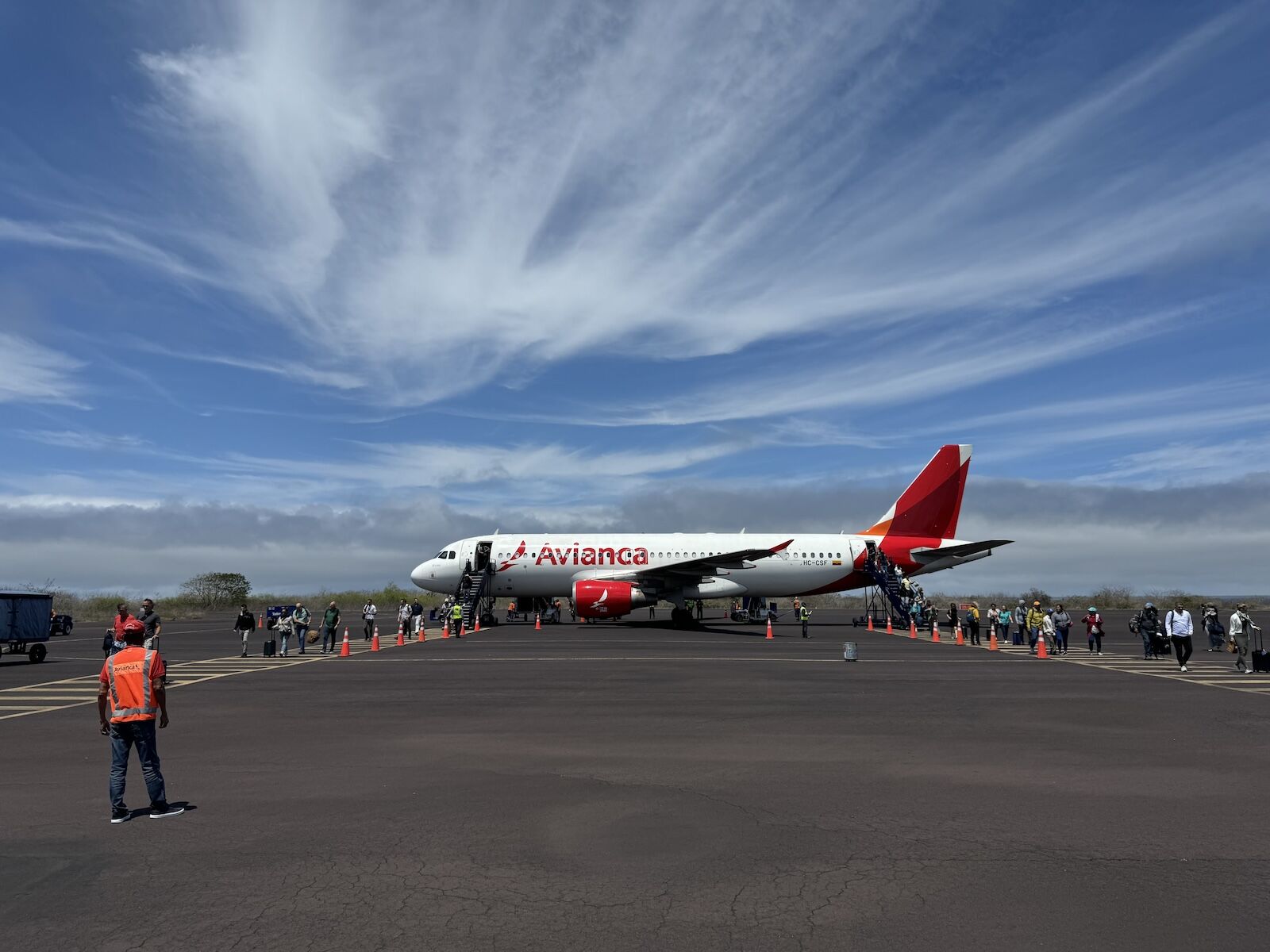
Landing in San Cristóbal in the Galápagos Islands. Photo: Jesse Adams
While my partner and I opted to stay in the Quito city center upon our return from the archipelago, after spending seven days exploring a peaceful and remote location, the urban landscape and noise was a big shock to the system. If you have the time to stay a little longer in Ecuador, I would recommend a more gentle reintroduction to real life by staying at the lovely beach-side accommodation Casa Tambo in Ayampe. Ayampe is a laid-back town just three hours by private bus or cab from the Guayaquil airport. There, you can take yoga and surf classes, as well as guided whale-watching and bird-watching tours, snorkeling sessions, and more. That way, you can keep the fun going and ease into the harsh reality of not being in the Galápagos Islands a little more kindly.
How much does it cost to travel with Ecoventura
As you might expect, cruising around the Galápagos Islands with a Relais & Châteaux expedition cruise line does not come cheap. In 2024, the rate for double occupancy is $9,950 per person and will climb to $10,500 in 2025. The fare does not include flights or crew gratuities. Everything else, including beverages, Wi-Fi, and excursions, is included. Ecoventura does offer very advantageous Black Friday deals every year.

More like this
TravelWhat I Packed for a Magical Week of Sea, Sun, and Wildlife-Watching in the Galápagos Islands
Source: View source

